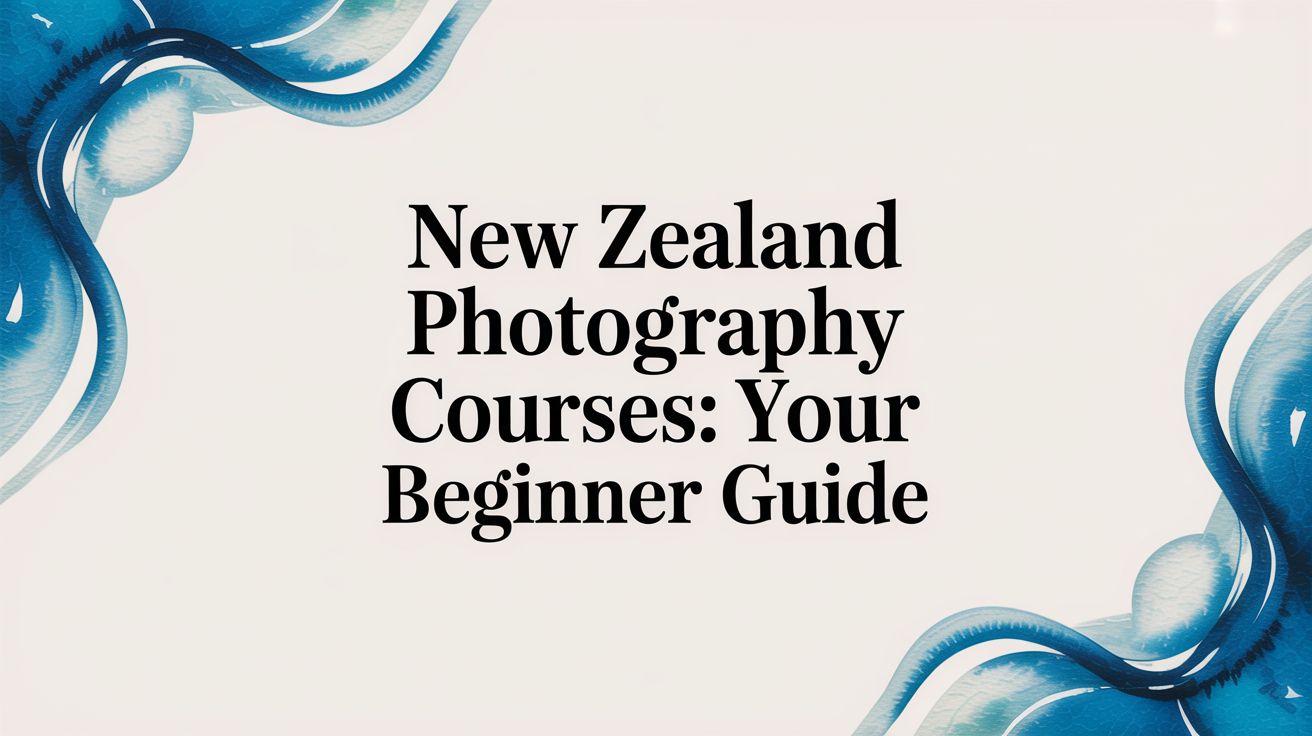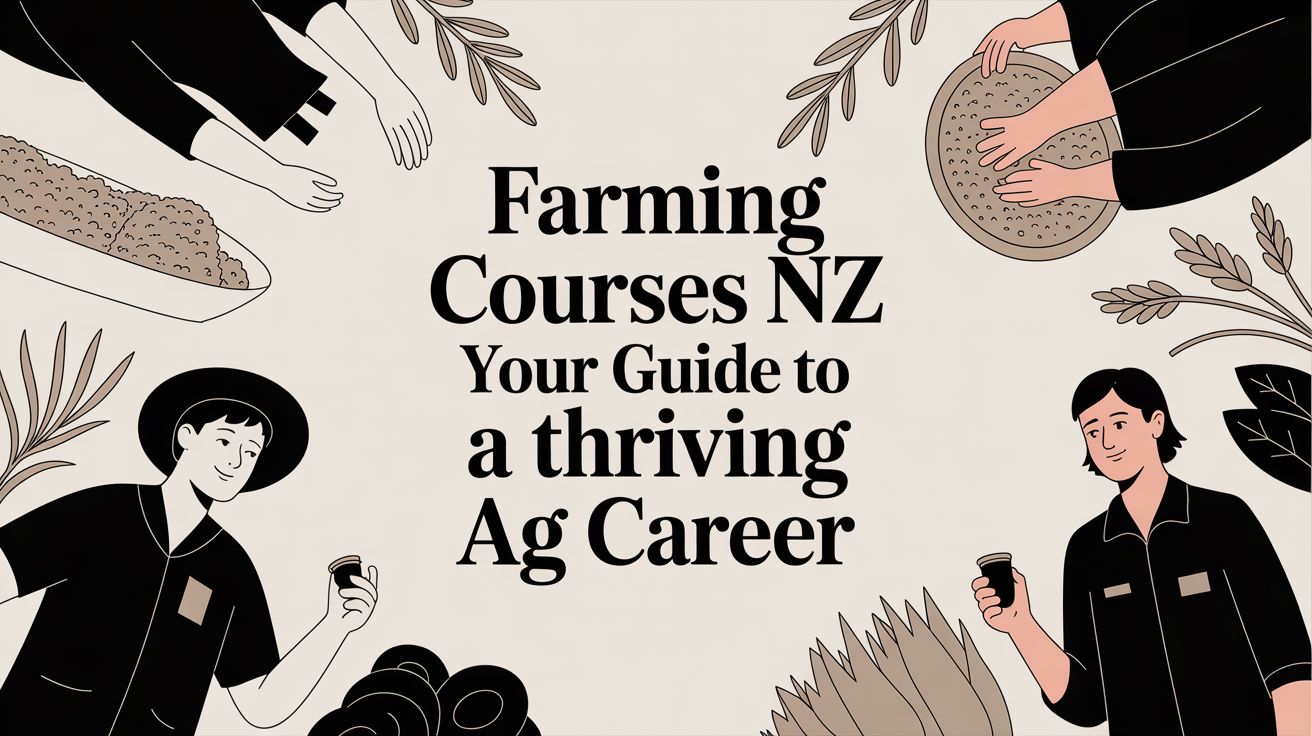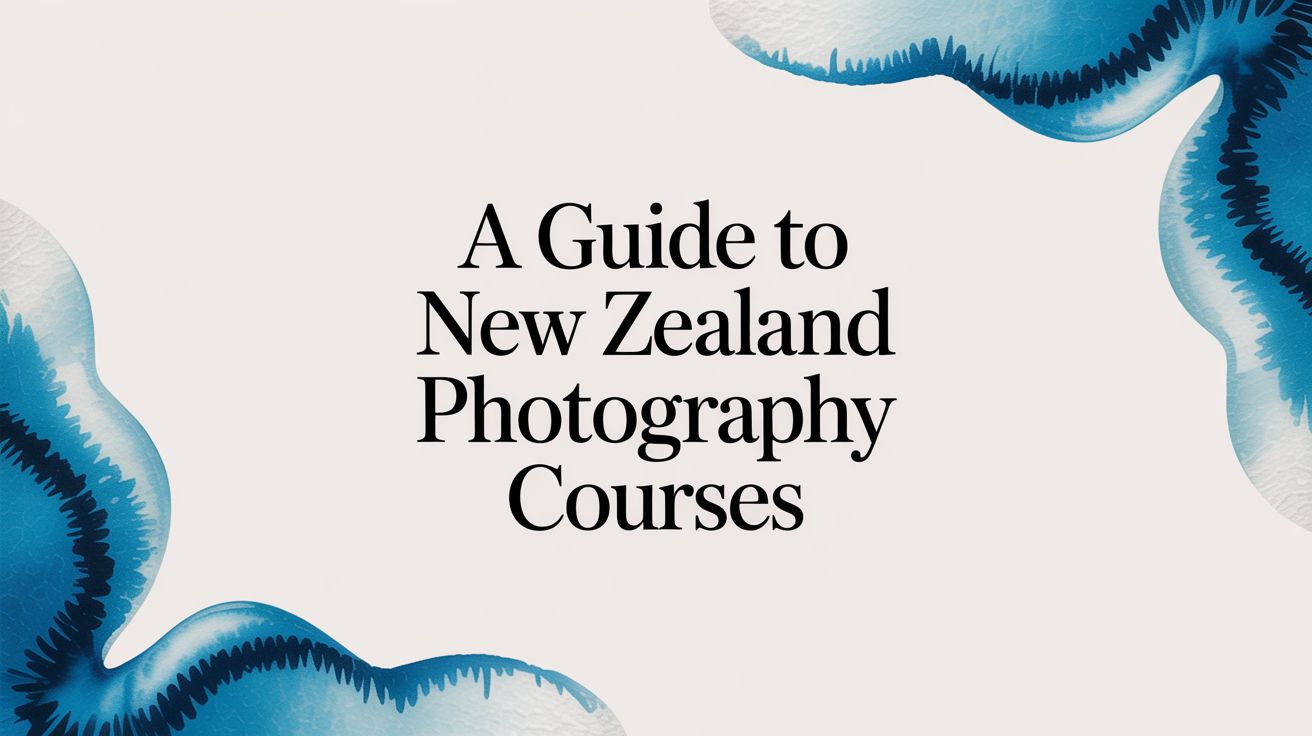
A Guide to New Zealand Photography Courses
With its epic landscapes and buzzing arts scene, New Zealand is an incredible place to get serious about photography. You’ll find a huge range of New Zealand photography courses out there, from quick weekend workshops to multi-year degrees, each offering a different way to sharpen your skills. This guide is here to help you make sense of it all so you can pick a course that really clicks with your creative and career goals.
Why Learn Photography in New Zealand?
Let’s be honest, New Zealand’s scenery is a photographer’s dream. From the icy mountains of the South Island to the volcanic drama up North, the whole country is basically a world-class outdoor studio. Every road trip or weekend tramp becomes a chance to build a stunning portfolio, making it one of the best places on earth to learn the art of capturing light and land.
This natural appeal has seen a real spike in people wanting to study photography here. The interest in creative fields has been growing steadily, with more and more students choosing to develop their visual storytelling skills.
A Growing Creative Community
The demand for high-quality photos and videos is stronger than ever, creating fertile ground for new talent to thrive. This growth is mirrored in education trends. According to the New Zealand Ministry of Education, student numbers in formal photography courses hit around 1,850 by 2023 — that’s a 54% jump in just eight years. It seems the country's unique landscapes and vibrant arts culture are a major drawcard for both Kiwis and international students.
This guide is designed to help you navigate this exciting field. We'll break down the different types of learning available, making a clear distinction between formal, NZQA-recognised qualifications and practical, skills-focused training.
Our main goal is to demystify the path from hobbyist to skilled photographer. We reckon that understanding the difference between academic theory and real-world, hands-on skills is the first step toward making a smart choice about your education.
Whether you're aiming to start a side hustle, build a full-time career, or just follow a personal passion, the right course can give you the structure and expertise you need. For those keen to get straight into practical learning, you can explore our range of hands-on photography courses designed for Kiwis. We’ll cover everything you need to know to find the perfect fit for your ambitions in Aotearoa.
Finding Your Fit: A Guide to Photography Course Formats
Picking a photography course in New Zealand is a bit like choosing the right lens for a shoot—what you pick depends entirely on the picture you want to create. The options are huge, ranging from quick one-day workshops to comprehensive, multi-year university degrees. Getting your head around these different formats is the first real step toward finding the perfect path for your creative journey.
Think of it this way: workshops are like adding a new, specialised filter to your kit. They're designed to help you nail a specific skill, whether that's capturing the stars over Lake Tekapo or mastering studio lighting for portraits. Certificates from private training providers are more like your first complete camera bag, giving you a solid set of practical tools you can start using straight away.
Then you have diplomas and degrees. These are the full architectural blueprints of photography, giving you a deep, structured, and theoretical understanding of the entire art form. Each path offers something valuable; it's just a matter of deciding if you need a specific tool right now or if you're ready to learn how to build the whole house.
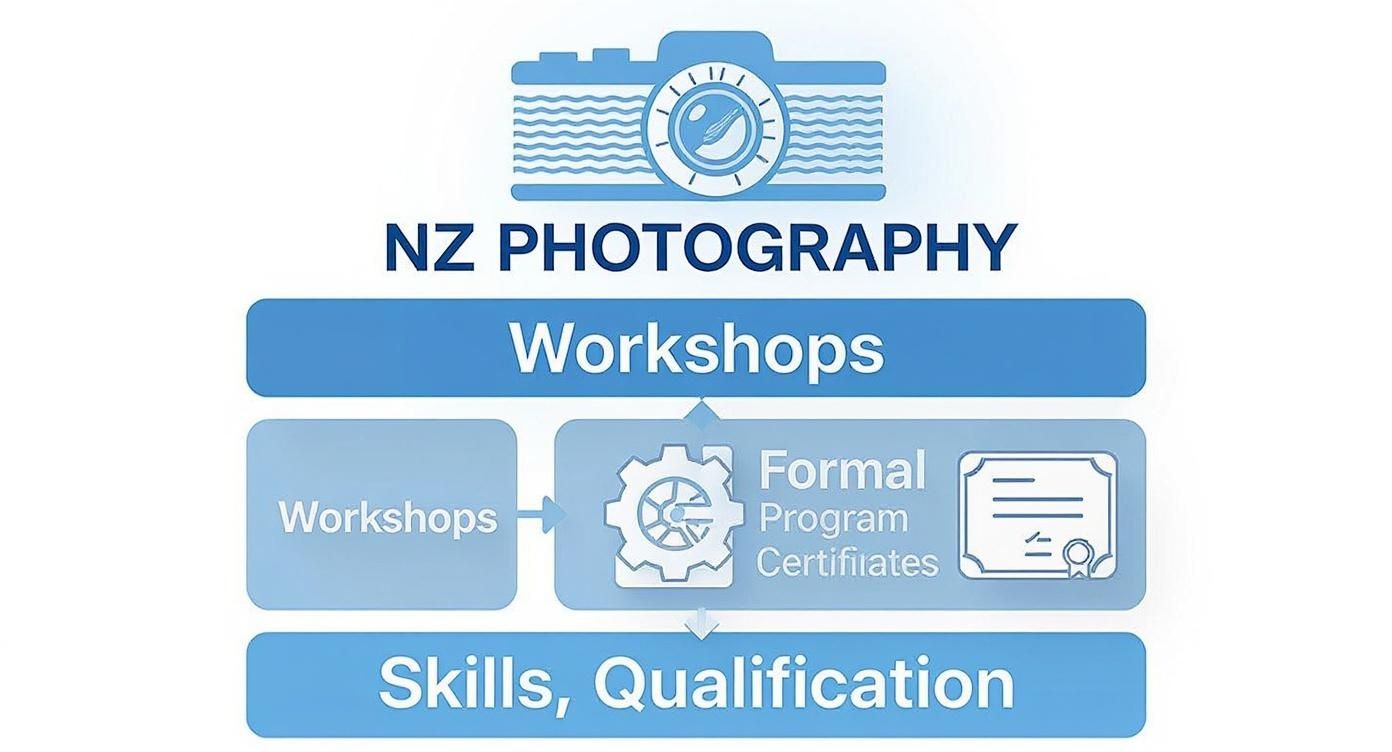
Ultimately, both focused workshops and formal programmes lead to fantastic outcomes. The right choice just depends on whether your priority is immediate, hands-on skill or a comprehensive, academic qualification.
Formal Qualifications vs. Practical Skills Training
In New Zealand, the world of photography education is split into two main streams. One path leads to formal, government-recognised qualifications, while the other is laser-focused on giving you industry-ready skills you can use tomorrow.
Formal Qualifications (Diplomas and Degrees): These are the big guns, offered by NZQA-registered institutions like universities and polytechnics. They are structured, in-depth programmes that usually take one to three years to complete. This route is ideal if you're aiming for a traditional academic credential and want a deep theoretical grounding in the craft.
Practical Skills Training (Workshops and Certificate Courses): Often run by private training organisations, these courses are all about efficiency and real-world results. The goal is to get you job-ready with marketable skills, fast. Think weeks or months, not years. This is the perfect choice for hobbyists wanting to level up, aspiring freelancers, or even pros needing to add a new skill to their arsenal.
It's important to know that private skills providers are typically not NZQA-registered colleges. Their mission isn't to hand out formal qualifications, but to deliver targeted, hands-on training that prepares you for the real, practical demands of being a photographer.
A Closer Look at the Main Course Types
So, what does each format actually look like? When you're weighing up your options, it helps to understand the different training delivery methods to see what clicks with your personal learning style.
Weekend WorkshopsThese are short, sharp, and seriously intensive sessions that zero in on a single topic. Imagine a weekend dedicated to mastering long-exposure seascapes or getting your head around off-camera flash. They’re a brilliant way to test the waters or quickly add a specific skill to your toolkit without a massive time commitment.
Certificate CoursesA certificate programme from a private training provider gives you a more structured, yet still condensed, learning experience. Running anywhere from a few weeks to several months, these courses cover a wider range of core topics—from camera basics and composition right through to your editing workflow. You walk away with a certificate of completion that proves you’ve got a solid, practical foundation.
This hands-on style is often built around active learning, where you really learn by doing. If you're not sure if that's for you, it's worth taking a moment to explore the difference between https://www.pracskills.co.nz/blog/active-vs-passive-learning-discover-your-ideal-method.
Diplomas and DegreesSigning up for a diploma or degree is a major investment in both time and money, but it leads to a formal academic qualification. These programmes are incredibly comprehensive, diving deep into art history, critical theory, and advanced technical skills. This is the path for those aiming for careers in academia, fine art, or high-level commercial photography, where a formal degree is often expected. Without a doubt, these are the most extensive New Zealand photography courses available.
Comparing Photography Learning Paths in New Zealand
To help you decide, here’s a quick breakdown of the different formats. This table should make it easier to see which path aligns best with your goals, schedule, and how you like to learn.
Each of these paths can lead to a successful and fulfilling photography journey. The "best" one is simply the one that gets you where you want to go, in a way that works for you.
What a High-Quality Photography Curriculum Includes
Forget the course title or the provider's flashy website for a moment. The curriculum is the real heart and soul of any photography programme. It’s the roadmap for your learning journey, and you need to know how to read it. A great curriculum finds that sweet spot between the 'how' and the 'why' of photography—blending hard technical skills with creative vision.
This balance is what truly separates a good course from a great one. You absolutely need to learn the science of photography—how aperture, shutter speed, and ISO dance together to create a perfect exposure. But just as important is the art of it all: developing your unique eye for composition, light, and storytelling.
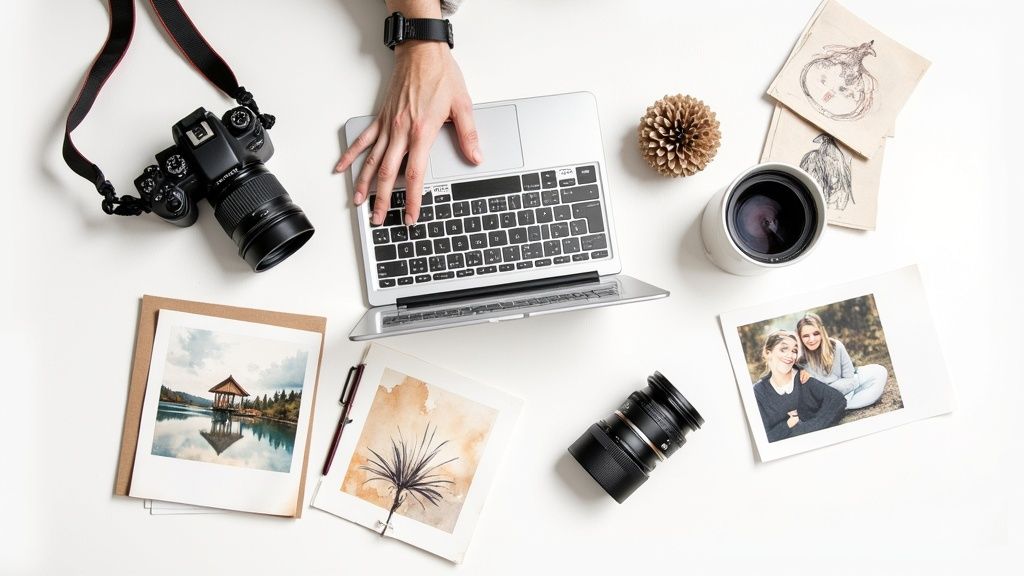
Core Technical Skills
Any photography course in New Zealand worth its salt has to start with a rock-solid technical foundation. This isn’t about memorising buttons; it’s about understanding your gear so well that it feels like an extension of your own mind. The goal is to look at a scene and instantly know the settings needed to bring your vision to life.
A strong technical curriculum will cover:
- Camera Mastery: Getting you off 'Auto' mode for good. You’ll become confident using Manual, Aperture Priority, and Shutter Priority modes, understanding exposure, metering, and focusing systems inside and out.
- The Science of Light: Learning to see, shape, and control light is arguably a photographer's most critical skill. The course should dive into natural light, studio lighting, and how to use tools like reflectors and diffusers to set the mood.
- Lens and Equipment Knowledge: It’s vital to understand how different lenses (prime vs. zoom, wide-angle vs. telephoto) completely change your final image. A good curriculum also covers the essentials like tripods, filters, and other key accessories.
A classic mistake is chasing expensive gear before mastering the fundamentals. A top-tier curriculum teaches you that the best camera isn't the priciest one—it's the one you know how to push to its absolute limits.
Creative and Artistic Development
Technical skills get your foot in the door, but creative vision is what makes your work unforgettable. A curriculum that only drills you on camera settings is missing half the picture. The artistic side of photography is all about finding your unique voice and learning to tell powerful stories through your images.
This means a deep dive into the principles of visual design.
- Composition and Framing: Moving way beyond the rule of thirds to explore leading lines, symmetry, depth, and negative space. These are the tools you'll use to create photos with real impact.
- Visual Storytelling: Learning to build a narrative within a single frame or across a series of photos. It’s about capturing emotion and conveying a message, not just documenting what's in front of you.
- Developing Your Style: A great course doesn't create clones. It encourages you to experiment and provides the constructive feedback needed to discover and polish your personal style, whether you love moody landscapes or vibrant street photography.
Practical Application and Modern Workflows
Theory is one thing, but photography is learned by doing. The best New Zealand photography courses are built around practical, hands-on assignments that force you to apply what you've learned in the real world. This is where the learning really sticks and where you start building a portfolio that gets you noticed.
On top of that, the curriculum has to reflect the realities of being a photographer today. That means a serious focus on post-processing and digital workflow. A complete curriculum should teach you how to edit photos professionally, mastering software like Adobe Lightroom and Photoshop to organise, tweak, and deliver your images efficiently.
Finally, look for modules on the business of photography. If you have any ambition to turn your passion into a side hustle or a full-blown career, topics like building a portfolio, marketing your services, and understanding client briefs are just as crucial as your skills with a camera.
Choosing Your Ideal Learning Environment
Where you learn photography is almost as important as what you learn. The big decision usually boils down to online versus in-person classes, and it’s often a trade-off between pure flexibility and hands-on, direct interaction. Both paths can get you to the same destination, but they suit very different people, schedules, and learning styles.
Think of it like choosing a location for a shoot. An in-person course is like a fully-equipped professional studio session. It’s structured, controlled, and you get to play with all the high-end gear. An online course, on the other hand, is more like a landscape expedition—you have the freedom to explore at your own pace, fitting the learning into your life and your own environment.
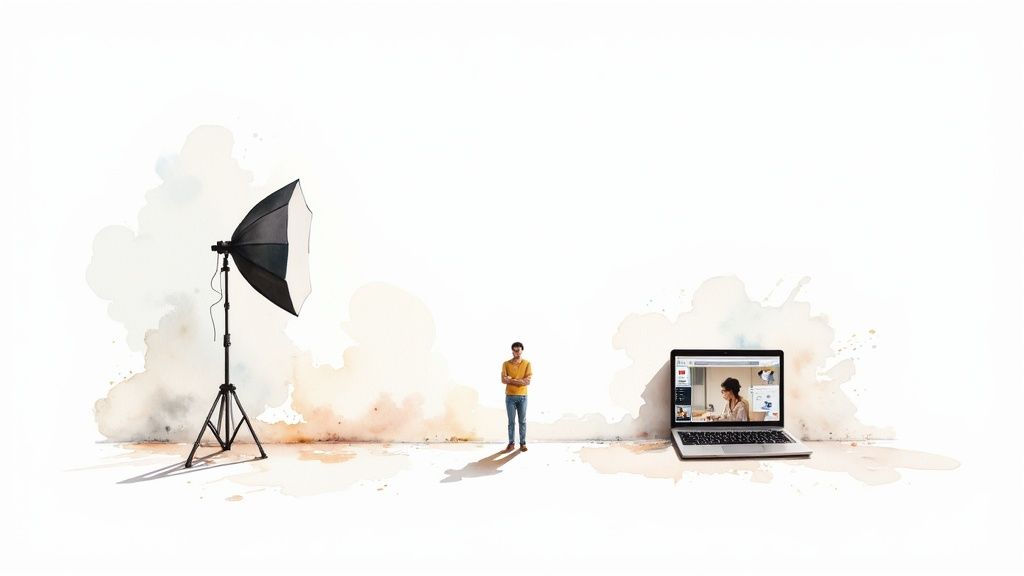
The Case for In-Person Photography Courses
There’s a certain magic that happens when you learn in a room with other people. In-person New Zealand photography courses offer a few key advantages that are tough to find online, especially if you’re someone who thrives on direct feedback and social energy.
- Hands-On Equipment Access: This is a big one. You get to use professional-grade studio lighting, different backdrops, and other specialised gear you probably don’t have lying around at home.
- Instant Instructor Feedback: Stuck on a tricky camera setting or can’t get the lighting right? The instructor is right there to look over your shoulder and guide you. That immediate correction can shave hours off your learning curve.
- Peer Collaboration and Networking: Learning side-by-side with other aspiring photographers creates a real sense of community. You can bounce ideas around, work on projects together, and start building your professional network from day one.
This setup is ideal for anyone who needs the structure of a set schedule to stay on track and benefits from the accountability of showing up to class each week.
The Power of Online Learning Flexibility
While face-to-face courses have their strengths, online photography courses have exploded in popularity for a very good reason. They offer a level of convenience that traditional learning just can't touch, making them a fantastic fit for busy Kiwis.
For many, the ability to learn from anywhere—be it your home office in Auckland or a bach in the Coromandel—is the single biggest draw. This removes geographical barriers, opening up top-quality training to people all over the country, not just those in the main centres.
Online learning puts you in the driver’s seat of your education. You decide when to watch the lessons, how often to practise, and how fast to move through the material, letting you master skills on a timeline that actually fits your life.
This self-paced approach is perfect for anyone juggling a job, family, or other commitments. You can re-watch tricky topics as many times as you need or breeze through concepts you already get. Plus, most good online courses have a community forum or student group, so you can still connect with classmates and tutors without being tied to a physical classroom.
Which Learning Style Is Right for You?
Ultimately, the best choice between online and in-person learning comes down to knowing yourself. To figure out what's right for you, have an honest think about these key questions.
- How disciplined are you? If you need the kick of a fixed schedule to stay motivated, an in-person course is probably your best bet. But if you’re a self-starter who’s good at managing your own time, the freedom of online learning is hard to beat.
- What’s your budget? Online courses generally have lower overheads, which often means more affordable fees. You also save on the time and money you’d spend commuting to a physical location.
- What gear do you need to access? If your main goal is to nail studio portraiture but you don't own any lighting gear, an in-person course with a fully kitted-out studio is a huge plus. If you’re all about landscape photography, you can learn the theory online and apply it with your own camera out in the field.
By weighing up these factors, you can pick a learning environment that doesn't just teach you the skills, but also slots perfectly into your lifestyle and helps you truly flourish as a photographer.
Breaking Down Course Costs and Time Commitments
Investing in your photography education is an exciting step, but it’s smart to get a handle on the practicalities before you jump in. The money and time you'll need for New Zealand photography courses can vary wildly, so having a clear picture of what's involved will help you plan your next move with confidence.
Let’s talk money first. The cost of learning photography can range from just a few hundred dollars for a weekend workshop to tens of thousands for a multi-year degree. A short, intensive workshop honing a specific skill might set you back $200 to $600, which is a great, low-risk way to get your feet wet. For something more substantial, practical certificate courses that build a broader foundation of skills often sit in the $1,000 to $4,000 range.
Understanding the Full Investment
When you’re crunching the numbers, remember the course fee is just the starting point. To get a true sense of the total cost, you need to factor in a few other potential expenses.
These often-overlooked costs can include:
- Essential Equipment: You don’t need the most expensive gear to start, but a reliable camera with manual controls is a must. You might also need to budget for lenses, a sturdy tripod, and memory cards.
- Software Subscriptions: In today's world, professional editing is a core photography skill. A subscription to software like Adobe Creative Cloud for Lightroom and Photoshop is a standard industry expense.
- Materials and Travel: If you're doing an in-person course, think about the costs of getting there, parking, and any materials like prints for your portfolio assignments.
For formal, multi-year programmes, the investment is much bigger. The cost of photography courses in New Zealand varies a lot, with the average annual tuition for a bachelor’s degree falling between NZD 27,000 and NZD 40,000 for international students. You can explore a detailed breakdown of costs for international students studying photography in NZ for more information.
It’s important to remember that practical skills providers are typically not NZQA-registered and therefore do not offer formal qualifications. Their fee structure is based on delivering targeted, industry-relevant training, which is a different model from academic institutions.
Factoring in Your Time Commitment
Just as important as the financial side is the time you’ll need to put in. This is where you need to be really honest with yourself about what fits into your life right now.
Full-time study for a diploma or degree is a massive commitment, usually demanding 20-40 hours per week of lectures, hands-on work, and self-directed study. This path is basically a full-time job, immersing you completely in your education.
On the other hand, part-time and online courses offer a lot more flexibility. A self-paced online certificate might only need 5-10 hours per week, letting you slot your learning around your job or family commitments. This approach puts you in the driver's seat, making it a fantastic option for busy Kiwis wanting to upskill without putting their life on hold.
Ultimately, whether you choose a weekend workshop or a flexible online course, understanding both the financial and time costs upfront is the key to a successful and stress-free learning journey.
Building Your Photography Career in New Zealand
Completing a photography course in New Zealand is an incredible achievement, but it’s really just the starting line of your creative journey. With new skills under your belt, a whole world of exciting career opportunities opens up across Aotearoa. The demand for high-quality visual content has never been greater, creating diverse pathways for skilled photographers.
It’s about looking beyond the traditional portrait and wedding photographer roles, though those are still fantastic options. The modern creative market is hungry for specialists. You could find yourself in commercial advertising, creating striking images for Kiwi brands, or in the fast-paced world of photojournalism, capturing stories that matter.

Other exciting fields include architectural photography that brings buildings to life, or becoming a digital content creator for brands, shooting everything from product flat-lays to engaging social media stories. The right training gives you the technical foundation to step confidently into any of these roles.
Your Portfolio: The Key to Unlocking Opportunities
Your portfolio is your single most important career tool. It's more than just a collection of your best photos; it's a curated showcase of your unique style, technical ability, and creative vision. Think of it as your visual CV—it needs to make a powerful first impression.
A strong portfolio should be:
- Specialised: Instead of showing a little bit of everything, focus on the niche you want to work in. If you want to shoot food, fill it with delicious, well-lit culinary images.
- Consistent: Ensure your editing style and quality are consistent throughout. This shows clients and employers that you have a reliable and professional workflow.
- Concise: Quality always beats quantity. Ten to fifteen outstanding images that demonstrate your best work are far more impactful than fifty average ones.
Building a standout portfolio takes time and dedication. It starts with the practical projects you complete during your course and grows as you continue to shoot, experiment, and refine your style.
Your portfolio is the ultimate proof of your skills. It doesn't just say you can take a good photo; it shows it. This is why practical, project-based courses are so valuable—they help you build this essential asset from day one.
Networking and Launching Your Business
Technical skill is crucial, but connecting with New Zealand’s creative community is what turns a passion into a career. Make a point of attending industry events, joining online photography groups, and connecting with other creatives. Building these relationships can lead to collaborations, referrals, and invaluable advice.
For many, the ultimate goal is to launch a freelance business. This requires a blend of creative talent and business sense. You’ll need to get your head around marketing, client communication, and pricing your work competitively. Establishing a strong digital footprint is non-negotiable. For practical advice on this, check out our guide on ten tips for a standout online presence.
The great news is that skilled photographers are in demand. Graduates from photography courses in New Zealand have shown strong employment outcomes, with recent statistics indicating that around 78% of diploma and degree holders find work within six months of graduating. According to Careers New Zealand, the average starting salary can range from NZD 48,000 to NZD 84,000 annually. With the right skills and a strategic approach, you can build a sustainable and rewarding career.
Common Questions About Photography Courses
Deciding to invest in your creative growth is a big step, and it’s only natural to have a few questions rattling around before you commit. To help you feel confident about choosing one of the many New Zealand photography courses on offer, we’ve put together answers to some of the most common queries we hear from aspiring photographers.
Do I Need an Expensive Camera to Start a Course?
Not at all. This is probably the biggest misconception out there—that you need professional-level gear from day one. In reality, the best foundational courses are designed to teach you the principles of light and composition that work with any camera, from a basic DSLR you’ve had for years to a brand-new mirrorless system.
The real focus is on learning to control your camera manually, not on having the fanciest kit. Trust us, it’s far better to master the fundamentals on a simple camera you know inside and out than to be overwhelmed by a complex one you barely understand. At the end of the day, your skills—not your gear—are what create stunning photos.
What Is the Difference Between a Diploma and a Workshop?
The main differences really come down to depth, duration, and what you walk away with. A diploma, usually from an NZQA-registered institution, is a formal qualification. It involves a structured, in-depth curriculum that can last one or two years, giving you a deep academic and theoretical grounding in photography.
On the other hand, a practical workshop or a certificate course is shorter and much more focused. Think of it as an intensive deep-dive into a specific, hands-on skill, like portrait lighting or landscape composition. These are designed for rapid skill building to get you shooting confidently, not for an academic credential.
Can I Make a Full-Time Career in Photography?
Absolutely. Plenty of photographers here in New Zealand have built successful, sustainable full-time careers. It definitely takes a strong blend of technical skill, a unique creative eye, and a solid dose of business sense. The industry is competitive, no doubt, so building an exceptional portfolio and a strong professional network is vital for success.
Many photographers thrive by diversifying their income streams. You might see someone shooting weddings on the weekend, tackling commercial projects during the week, and selling prints of their landscape work online. The right training gives you the foundation you need to carve out any of these paths.
Are Online Photography Courses Really as Effective?
Yes, both online and in-person courses are highly effective—they just click with different types of learners. Online courses offer incredible flexibility, which is perfect for self-motivated people who need to fit their studies around work, family, or other commitments. You can learn at your own pace, on your own schedule.
In-person courses, by contrast, give you that immediate, hands-on feedback and direct access to professional studio gear you might not have at home. The best choice really depends on your personal learning style, your schedule, and what you ultimately want to achieve with your photography.
Ready to turn your passion into practical skills? Prac Skills offers online, hands-on photography courses designed for busy Kiwis. Start building your portfolio today at https://www.pracskills.co.nz.
.webp)
